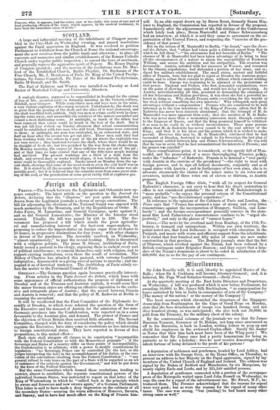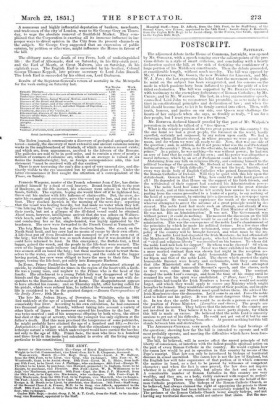TillortlInutuno.
Sir John Remaly will, it is said, !shortly be appointed Master of the Rolls ; when Sir As Cockburn will become Attorney-General ; and, it is believed, Mr. Page Wood Solicitor-General.—Daily News.
At the quarterly meeting of the East India Directors and Proprietors, on Wednesday, a bill was produced which is now before Parliament, for awarding 10,0001. to Mr. James Silk Buckingham, "as compensation for losses sustained by him in India in consequence of acts of the Company."' [The money of the nation ? or the money of the Company ?]
The local accounts which chronicled the departure of the Singapore- steam-ship from Southampton for the Cape of Good Hope on Monday, state that she bore detachments of troops nine hundred strong, and not three hundred strong, as was anticipated ; she also took out 50,000/. in gold from the Treasury, for the military chest of the colony.
By the controversial columns of the journals we see that Sir James Emerson Tennent, Governor of St. Helena, not long since announced as off to his Barataria, is back in London, writing letters to prop up and shield his employers in the awkward Ceylon affair. Surely the Auster or Notus that blew him back must have been of the Whig party ! We remember that Sir James once had a pretty honorarium for being so patriotic as to take a holyday : does he now receive demurrage for the adroit fortune of being detained to the profit of his patrons ?
A deputation of noblemen and gentlemen' headed by Lord Ashley, had an interview with Sir George Grey, at the Home Office, on Thursday, to present an address to her Majesty on the Papal aggression signed by lay- members of the United Church of England and Ireland. The address was signed by the Dukes of Bedford and Manchester, by six Marquises, by nearly eighty Earls and Lords, and by 321,240 untitled persons.
A deputation of gentlemen connected with a portion of the newspaper press of the Metropolis waited upon Lord John Russell on Wednesday, tie urge the case for a repeal of the advertisement tax. Mr. Ewart, M.P., in- troduced them. The Premier acknowledged that the reasons for repeat were very good ; but so were the reasons for the repeal of many other taxes. The case was strong, "but (smiling) he had heard many other strong cases as well." A numerous and highly influential deputation of bankers, merchants, and tradesmen of the city of London, went to Sir George Grey on Thurs- day, to urge the absolute removal of Smithfield Market. They com- plained that the Corporation is exerting all its immense influence in im proper ways to divert opinion in the City from its present channels on the subject. Sir George Grey suggested that an expression of public opinion, by petition or otherwise, might influence the House in favour of the bill.
The obituary notes the death of two Peers, both of undistinguished life : the Earl of Albemarle, died on Saturday, in his fifty-sixth year ; and the Earl of Meath, at Great Malvern, also on Saturday, in his eightieth year. The English Earl is succeeded by his brother, Colonel George Thomas Keppell, late private secretary to Lord John Russell. The Irish Earl is succeeded by his eldest son, Lord Brabazon.
Results of the Registrar-General's return of mortality in the Metropolis for the week ending on Saturday last.
Ten Weeks of 1841-50.
Zymotie Diseases 1,748 Dropsy, Cancer, and other diseases of uncertain or variable seat 546 Tubercular Diseases 1,912 Diseases of the Brain, Spinal Marrow, Nerves, end Senses 1,263
Diseases of the Heart and Blood-vessels 320
Diseases of the Lungs, and of the other Organs of Respiration 1,810 ....
....
....
• • • • Week.
of 1851. 283 55 233 123 352 Diseases of the Stomach, Liver, and other Organs of Digestion 597 • • • • 67 Diseases of the Kidneys, &c 10' • • • • 14 Childbirth, diseases of the Cterns, &c 105 • • • • 10 Rheumatism, diseases of the Bones, Joints, ite 70
5 Diseases of the Skin, Cellular Tissue, ,te 9 • • • • 3 'Malformations 22 • • • •
Premature Birth 215
39 Atrophy 163
24 ftfie 635
74 Sudden 94 • • • • 18 Violence, Placation, Cold, andlutemperanee 268
38 Total (including unspecified causes) 9.931
1,401
The Baden journals communicate a discovery of geological antiquarian in- terest—namely, the discovery of most extensive and ancient calamine mining works in the neighbourhood of Orislach, of which no modern record exists; and which are, from appearances, ascribed to the labours of the Romans. The galleries are said to be in good order, and to contain a store of nearly a million of centners of calamine ore, which at an average is valued at six florins the hundredweight; but, as foreign correspondence adds, this last statement "must be received with all due caution.'
There is now traversing the sun's disc a spot of very unusual size, and dis- tinctly visible to the eye unassisted but by smoked glass or fog. Under the latter circumstance it first caught the attention of a correspondent of the Times, on Sunday.
Francois Wacgone, master of the French schooner Joan d'Are, has distin- guished himself by a deed of cool bravery. Bound from myth to the port of Boulogne, on the 5th instant, his schooner went ashore on the Corton Sands, Suffolk. The captain, hoping she would blow off if he lightened her, threw out his anchor with fifty fathoms of chain-cable. But, the crew, de- spite his example and entreaties, gave the vessel up for lost, and put (din a boat. They reached Ipswich in the morning of the next day ; reporting
the vessel was beating heavily, but had made no water when they left. "11 Yearing the facts," says the Ipswich Journal, "out beachmen launched their yawls, but not a glimpse of the ill-fated vessel could be obtained. About noon, however, intelligence arrived that she was ashore on Walbers- 'wick beach, and the captain safe. His intrepidity in slipping his anchor and conducting her so far, single-banded, was highly applauded by the beachmen. The crew were forwarded to the French Consul at Yarmouth."
The brig Mary has been lost on the Goodwin Sands. She struck on the North Sand head, and her crew had no means of escape by their own efforts. A life-boat put off from Broadstairs and managed to get seven men out of the brig ; but the life-boat was so much damaged that it was doubtful if it could have returned to land. In this emergency, the Buffalo Gal, a Deal lugger, gained the wreck, and the people in the life-boat were rescued. The crew of the lugger made toilsome and daring efforts to save the master and two seamen still on board the brig ; but these mariners feared to trust them- selves to the water, even with life-preservers, and the cable of the lugger having parted, her crew were obliged to leave the men to their fate. The lugger, towing the life-boat, got safely into Ramsgate Harbour.
In Rome, Prince Paskievitsch has made a most determined attempt at suicide, by stabbing himself six times in the region of the heart with a knife. He was a young man, and nephew to the Prince who is the head of the family. His attachment to a young Polish lady was disapproved of by his i friends and the Emperor, and n order to break it off he was sent with de- spatches to the Russian Ambassador at Rome. The disappointment appears to have affected his reason ; and on Thursday night, after having called for his pistols, which were refused him, he inflicted the wounds mentioned. His life is considered to be in the greatest danger.—Roman Correspondence of the Daily Hetes ; 10th March.
The late Mr. Joshua Dixon, of Downton, in Wiltshire, who in 1801 died suddenly at the age of a hundred and three, had all his life been a remarkably free liver. According to his own calculation, he had consumed two thousand gallons of brandy, without taking into account a variety of other kinds of liquor. He moreover enjoyed his faculties to the last. He was twice married ; and of his numerous offspring by both wives, the oldest had died at the age of seventy, while the youngest was only eighteen at the father's death. Had this man practised the temperance of some patriarchs, he might probably have attained the age of a hundred and fifty.—Deeizes Independent.—[It is just as probable that the stimulants exaggerated in a lethargic nature a vitality which undeveloped would have carried the baccha- nal only to the age of fifty. Prima facie the man who lives to a hundred and three lived in the mode best calculated to evolve all the living energy .particular to his constitution.]



























 Previous page
Previous page